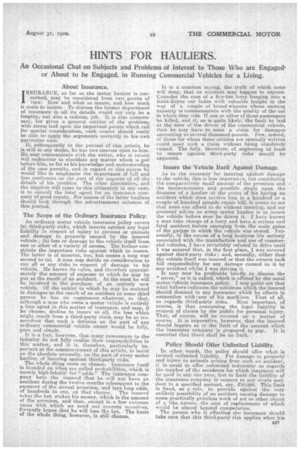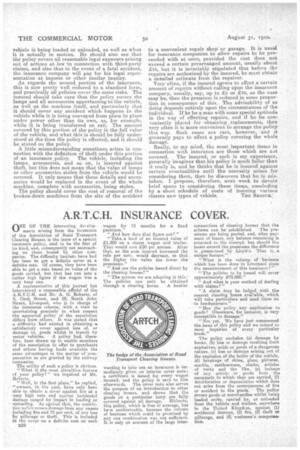HINTS FOR HAULIERS.
Page 21

Page 22

If you've noticed an error in this article please click here to report it so we can fix it.
An Occasional Chat on Subjects and Problems of Interest to Those Who are Engaged, or About to be Engaged, in Running Commercial Vehicles for a Living.
About Insurance.
INSUR,A_NCE, so far as the motes haulier is concerned, may be considered from two points of view. How and what to insure, and how much it costs to insure. To discuss the former department of insurance' in all its details would not only be a lengthy, but also a tedious, job. It. is also unnecessary, for given a general outline of the problem, with stress laid upon the important points which call for special consideration, each reader • should easily be able to apply the arguments correctly to his own particular ease.
If, subsequently to the perusal of this article, he is still in any doubt, he has two courses open to him. He may communicate with the writer, who in return will endeavour to elucidate any matter which is put before him, so far as his knowledge and understaeding of the ease permits, and in regard to this course he would like to emphasize the importance of full and free confession on the part of the inquirer of all the details of his troubles. The other alternative, • and • the inquirer will come to this ultimately in any case, is to consult the local agent for an insurance company of good repute. For names of the latter hauliers should look through the advertisement columns of this journal. • ,
The Scope of the Ordinary Insurance Policy.
An ordinary meter vehicle insurance policy covers (a) third-party risks, which insures against any legal liability in respect of injury to persons or animals and damage to property caused by the insured vehicle; (b) loss or damage to the vehicle itself from one or other of a variety of causes. The former constitute the important risks against which to insure._ The latter is of moment, too, but comes a long way second to (a). A man may decide on consideration to run all or any risks in respect of damage to his vehicle. He knows its value, and therefore approximately the amount of expense to which he may be put as the result of an accident. At the most he will be involved in the purchase of an entirely new vehicle. Of the extent to which he may be mulcted in damages as the result of an accident to some third person he has no cognisance whatever, so that, although a man who owns a motor vehicle is entirely a free agent in this matter of insurance, and may, if he choose, decline to insure at all, the losn which might result from a third-party claim may be so tremendous that -such a decision on the part of any ordinary commercial vehicle owner -would be folly, pure and simple. .
It is-a fact, however, that many newcomers to theindustry do not fully realize their responsibilities in this matter, and it is, therefore, particularly important at the commencement of this article, to insist on the absolute necessity, on the part of every motor 'haulier, of insuring against third-party risks. The whole thing rests on chance. Insurance itself is founded on What are called probabilities, which is merely high-falutin' for "odds." The insurance company bets the ' insured ' that he will not have an accident during the twelve months subsequent to the payment of the annual premium, and lays long odds. of hundreds to one, on that chance. The insured takes the bet, stakes his money, which is the amount of the premium, and then, except in. afew extreme cases with which we need not concern ourselves, fervently hopes that he will lose the bet. The basis of the whole thing, however, is still chance. It is a common saying, the truth of which none will deny, that an accident may happen to anyone. Consider the case of a five-ton lorry barging into a Roils-Royce ear laden with valuable freight in the way of a couple of bread-winners whose earning capacity is commensurate with the qifality of the car • in which they ride. If one or other of those passengers be killed, and if, as is quite likely, the fault be laid at the door of the driver of the commercial vehicle, then he may have to meet a claim for damages amounting to several thousand pounds. Pew, indeed, of those for whom these articles are specially written could meet such a claim without being absolutely ruined. The -folly, therefore, of neglecting at least to insure against third-party risks should be apparent.
Insure the Vehicle Itself Against Damage.
As to the necessity for insuring against damage to the vehicle, this is less imperative; but considering the comparatively small amount of the premium and the inconveniences and possible strain upon the finances of a haulier in the event of his having an accident which does involve him in a hundred or a couple of hundred pounds repair bill, it seems to me that none can afford to do Without insuring, end my personal advice to every motor haulier is to insure the vehicle before ever he drives it. I have known a man take charge of a lorry and have a serious and fatal accident before emerging from the main gates of the garage in which the vehicle was stored. Personally, in the course of a long business life entirely associated with the manufacture and use of commercial vehicles, I have invariably refuted to drive 'until I was assured that, in the first place, I was covered against third-party risks'; and, secondly, either that the vehicle itself was insured or that the owners took full responsibility for any damage caused to it by any accident whilst I wan driving it. It may now be profitable briefly, to discuss the " cover,' as it is called, which is offered by the usual motor vehicle insurance policy. I may point out that what follows indicates the minimum which the insured should demand in any insurance which he effects in connection with ,any of his machines. First of alb
as regards third-party risks. Most important, of course, is that concerning the legal liability in respect of claims by the public for personal injury. That, of course, will be covered as a matter of course. It is imperative, however, that the insured should inquire as to the limit of the amount which the insurance company is prepared to pay. It is essential that there shall.be no limit.
Policy Should Offer Unlimited Liability.
In other words, the policy should offer what is termed unlimited liability. For damage to property and injury -to animals arising from such an accident, it is usual to offer unlimited indemnity as regards the number of the accidents for which insurance will be paid in any one year, but to limit the liability of the insurance company in respect to any single accident to a specified amount, say, £1°,000. This limit is fixed, as a rule, to provide against the very unlikely possibility of anaccident causing damage to somepractically priceless work of art or other object of a like nature, the cost of replacement of which would be almost beyond computation.
The person who is effecting the insurance should take care that this third-party risk applies when his vehicle is being loaded or unloaded, as well as when it is actually in motion. He should also see that the policy covers all reasonable legal expenses arising out of actions at law -in connection with third-party claims, and also that in the event of a fatal accident, the insurance company will pay for his legal representa,tion at inquest or other similar inquiry. As regards the second portion of the insurance, this is now pretty well reduced to a standard form, and practically all policies cover the same risks. The insured should take care that the policy covers the lamps and all accessories appertaining to the vehicle, as well as the machine itself, and particularly that it should cover any accident which happens to the vehicle while it is being conveyed from place to place under power other than its own, as, for example, while it is being transferred on rail. The amount covered by this portion of the policy iS the full value of the vehicle, and what this is should be fully understood at the time the policy is effected, and it should be stated on the policy. A little misunderstanding sometimes arises in connection with the definition of theft under this portion of an insurance policy. The vehicle, including the lamps, accessories, and so on, is insured against theft, but this does not mean that the value of lamps or other accessories stolen from the vehicle would be covered. It only means that these details and accessories would be replaced in the event of the whole machine, complete with accessories, being stolen. The policy should cover the cost of removal of the broken-down machines from the site of the accident to a convenient repair shop' or garage.. It is'usual for insurance companies to allow repairs to be proceeded with at once, provided the cost 'does not exceed a certain prearranged amount, usually about £10, but it is invariably stipulated .that before the repairs are authorized by the insured, he must obtain a detailed estimate from the repairer.
-Very often, if the insured agrees to effect a certain amount of repairs without calling upon the insurance company, usually, say, up to g5 or .210, as the case may be, then the premium is reduced in some proportion in consequence of this. The advisability of so doing depends entirely upon the circumstances of the individual. If he be a man with some special aptitude in the way of effecting repairs, and if he be conveniently placed for obtaining _replacements, then very often it is more convenient to arrange the policy this way. Such cases are rare, however, and it generally pays to effect a policy covering the whole damage.
Really, to my mind, the most important items in connection with insurance are those which are not covered. The insured, or such is my experience, generally imagines that his policy is much fuller than it really is, and he thinks that he is insured against certain eventualities until the necessity arises for considering them, then he 'discovers that he is mistaken. I propose, therefore, next week to devote brief space to considering these items, concluding by a short schedule of costs of insuring various classes anw types of vehicle. THE SEOTCH.',




























